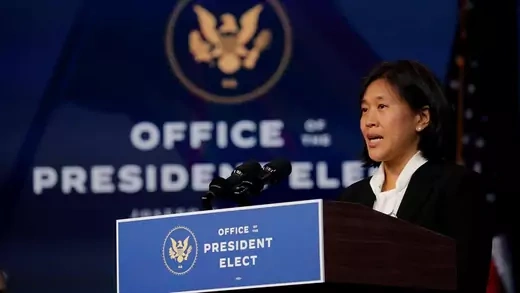After Trump: What Will Biden Do on Trade?
President Trump disrupted U.S. trade policy in the name of better deals. President-Elect Biden proposes a combination of stronger domestic investment and better coordination with allies.
By experts and staff
- Published
By
- James McBrideDeputy Managing Editor
President Donald J. Trump’s disruptive America First agenda was nowhere on greater display than in the realm of trade policy, where he launched a trade war with China, imposed tariffs on U.S. allies, and renegotiated major trade agreements.
President-Elect Joe Biden has slammed Trump’s approach but likewise hammered China’s unfair practices and criticized unrestrained globalization. His “foreign policy for the middle class” promises no new trade talks until Washington undertakes massive domestic investments.
What has Trump done on trade?
Trump took aim at a global trading system he said was rigged against U.S. interests and responsible for large trade deficits, declining U.S. manufacturing, and the offshoring of American jobs.
His administration’s major moves included:
Withdrawal and disengagement. He withdrew from the Barack Obama administration’s Asia-Pacific trade deal, the Trans-Pacific Partnership (TPP), and halted talks on a comprehensive U.S.-European Union trade deal. He also crippled the World Trade Organization’s (WTO) dispute resolution body by blocking new appointments and threatened outright withdrawal.
Renegotiation. He renegotiated the North American Free Trade Agreement (NAFTA) with Canada and Mexico, now known as the U.S.-Mexico-Canada Agreement (USMCA), as well as the U.S.-Korea Free Trade Agreement with South Korea. He also negotiated a limited deal with Japan, which his administration called a first step toward a broader agreement.
Tariffs. He applied broad tariffs on steel and aluminum from around the world, including Canada and Europe, which the administration argued was necessary on national security grounds to combat Chinese overproduction. He also imposed tariffs on some EU consumer goods and threatened them on EU auto imports.
China trade war. He entered into a protracted trade war with China that included tariffs on hundreds of billions of dollars worth of Chinese imports, economic retaliation from Beijing, and start-and-stop negotiations.
Talks with China eventually resulted in a “phase one” deal in which Beijing pledged to buy an additional $200 billion worth of U.S. agricultural products; so far it has not kept up that agreement. The bilateral trade deficit with China has held steady, even as the overall trade deficit has reached a fourteen-year high. The USMCA, meanwhile, passed with broad bipartisan support in Congress after Democrats negotiated stronger labor and environmental provisions.
What has Biden proposed?
During his presidential campaign, Biden sought to chart a course somewhere between Trump’s trade wars and an uncritical acceptance of free trade.
He hammered Trump’s go-it-alone approach, arguing that Washington must “write the rules of the road” on trade within the existing international system. He has long been a supporter of trade liberalization: as vice president he championed the TPP, and as a senator he voted for NAFTA and China’s entry into the WTO.

But he has also voted against trade deals that he saw as weak on workers’ rights and environmental protections, such as one with Peru in 2006. And some of his rhetoric on China echoes Trump’s, calling for “aggressive” retaliation against Beijing’s trade cheating.
The main difference is that Biden promises to unite with U.S. allies, such as the EU, in a common front against China. But with Biden making no promises on ending existing tariffs on EU products, that could be a challenge. A recent EU-China investment treaty could also undermine Washington’s coordination with Brussels.
What does “foreign policy for the middle class” mean?
This is Biden’s slogan for an approach to foreign affairs that will purportedly measure any policy by what it does for middle-income families. The approach is fleshed out in a recent report coauthored by Biden’s pick for national security advisor, Jake Sullivan.
It argues that globalization has increased inequality, accelerated deindustrialization, and failed to boost U.S. productivity. As a result, Biden promises to focus on domestic priorities to boost U.S. competitiveness, including by investing trillions of dollars into energy, education, and infrastructure; implementing federal “Buy American” policies to favor domestic producers; and strengthening workers’ bargaining power.
“Until now, trade negotiations were aimed at securing business opportunities for U.S. companies first, and to a lesser extent, to lower prices for U.S. consumers,” explains CFR’s Edward Alden. “There is no concept of lifting the middle class in the current structure. It will be a different set of priorities.”
What comes next?
Once in office, Biden and his nominee for U.S. trade representative, Katherine Tai, will have many decisions to make. Biden says he won’t immediately lift Trump’s China tariffs, arguing that Washington needs to keep its leverage with Beijing for now.
Then there are the fates of various trade deals—which include not only the question of whether to rejoin the TPP, but also whether to restart defunct U.S.-EU negotiations and to continue trade talks Trump started with Kenya and the United Kingdom. Biden will also have to decide how to proceed with the selection of the next WTO director-general and revamping the WTO dispute process—a controversy that predates Trump.
Looming over all of this is the July 2021 expiration of Trade Promotion Authority, or fast-track legislation that gives the White House expanded trade negotiating powers. If TPA is not renewed, any new deals could face an uphill battle in Congress.